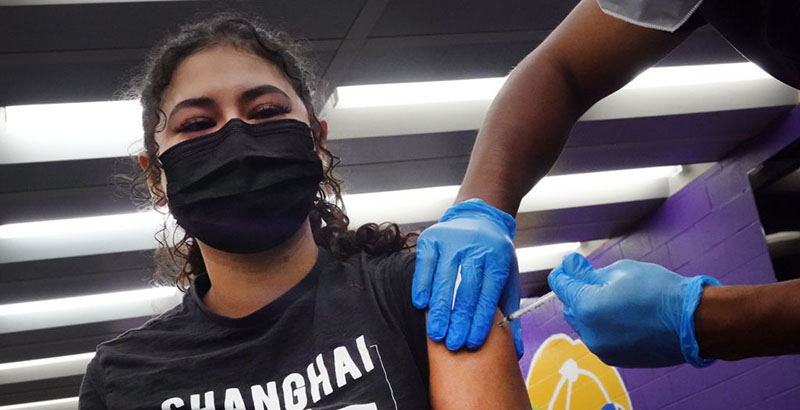Youth Ages 16 & 17 Now Eligible for Pfizer Booster Dose, FDA Says

Get stories like this delivered straight to your inbox. Sign up for The 74 Newsletter
Young people ages 16 and 17 may now receive a third dose of the Pfizer-BioNTech coronavirus vaccine six months after their second shot, the U.S. Food and Drug Administration announced Thursday.
The news comes as the number of average daily COVID cases in the U.S. has surged 27 percent in the past two weeks, and as fears for spread of the Omicron variant have motivated a spike in vaccinations to a level not seen since late May.
“With both the Delta and Omicron variants continuing to spread, vaccination remains the best protection against COVID-19,” said Acting FDA Commissioner Janet Woodcock in a press release.
The Omicron strain, listed as a “variant of concern” by the World Health Organization in late November, currently makes up a miniscule fraction of U.S. infections, but features a combination of mutations that worries scientists. It is known to have infected more than 40 people in the U.S., the director of the Centers for Disease Control and Prevention told the Associated Press Wednesday.
The first look at how vaccines hold up against the Omicron variant bodes well for the efficacy of Pfizer-BioNTech’s booster doses, experts say.
Lab data published Tuesday analyzing how effectively blood from vaccinated South Africans neutralized the new strain found that the virus did evade the immune defenses more craftily than previous versions of COVID. However, blood from individuals who had a previous infection and then received two vaccine doses did a good job staving off Omicron. It’s the best proxy so far for the immunity of those who have received three doses, scientists say, because South Africa has not yet authorized booster shots.
“This study gives me great hope that our boosters will help protect against Omicron,” Katelyn Jetelina, an assistant professor of epidemiology at the University of Texas School of Public Health, wote in a newsletter explaining the new lab results.
In authorizing third doses for 16- and 17-year olds, the FDA expanded its already existing emergency use authorization for the Pfizer-BioNTech vaccines to include older teens. Before shots can be officially administered to the newly eligible group, they need to receive the green light from the CDC, an authorization that is expected to come swiftly. The federal agency cleared boosters for all adults 18 and older in early November.
“Since we first authorized the vaccine, new evidence indicates that vaccine effectiveness against COVID-19 is waning after the second dose of the vaccine for all adults and for those in the 16- and 17-year-old age group,” said Peter Marks, director of the FDA’s Center for Biologics Evaluation and Research. “A single booster dose of the vaccine for those vaccinated at least six months prior will help provide continued protection against COVID-19 in this and older age groups.”
Meanwhile, as many Americans are still wrapping their minds around first, second and third doses, Pfizer CEO Albert Bourla said late Wednesday that the Omicron variant could mean fourth shots will be necessary in under 12 months.
New Mexico appears to be the first state to require that certain workers receive booster shots, including a vaccinate-or-test rule for K-12 staff. So far, about 9 percent of school employees statewide have submitted documentation of having received a third dose.
Ensuring that staff and eligible students up their immunity as Omicron threats loom may be of particular importance given that temporary school closures have continued through the fall. Roughly 10 percent of the nation’s schools have experienced a disruption this school year alone. Some closures have been due to outbreaks, but others have been caused by teacher burnout and staffing shortages.
As of Dec. 1, some 4.3 million children ages 5 to 11, representing 15 percent of the age group, had received a vaccine dose. The same was true for 3 in 5 adolescents ages 12 to 17, and over half had completed the full two-dose series, according to data published by the American Academy of Pediatrics.
Across all ages, more than 200 million people in the U.S are now fully vaccinated, about 60 percent of the population.
Get stories like these delivered straight to your inbox. Sign up for The 74 Newsletter

;)
